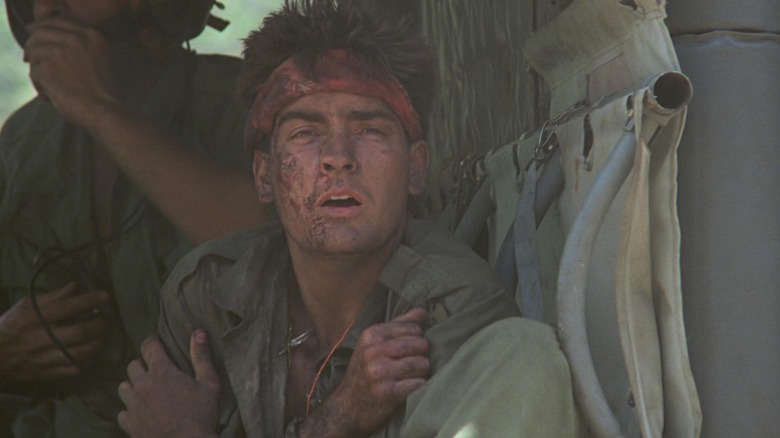Oliver Stone's Platoon Was Such A Global Hit, Nearly Half Its Revenue Came From International Film Rights
War movies being released worldwide can be a legitimate form of geopolitical soft power. As great of a film "Top Gun: Maverick" is, there's no denying its usefulness as both a recruitment tool and a projection of US military power across the globe. The same was true of the first "Top Gun," which was released just seven months before "Platoon" in 1986.
If Hollywood's ties to the U.S. military aren't a strong enough example, look no further than China's recent state-led efforts to recreate the American box office formula through its own homegrown franchises like "Wolf Warrior 2," which pits an underdog, Rambo-like Chinese soldier against a rogue group of American mercenaries.
At the same time, not every successful war film has painted the filmmaker's home country in the best light. As both a domestic and international hit that depicts the atrocities of the Vietnam War, "Platoon" is one such movie. After its release in December 1986, the Oliver Stone-directed and Orion Pictures-produced war drama earned an impressive $138 million in the U.S. against only a $6 million production budget.
In preparation for the 1987 American Film Market (AFM) conference in March, where industry professionals gather each year to trade distribution rights for new and upcoming films, foreign investors were looking at the U.S. box office for "Platoon" with dollar signs in their eyes. Its nomination for eight Academy Awards (of which it would later win four) would only accentuate the demand.
Instant classic
At the AFM in March, representatives of Orion Pictures received many inquiries regarding international distribution rights for "Platoon." The company's Senior VP and International Sales Manager, David Lamping, told The Hollywood Reporter in November 2022 that by the time AFM came around, all the foreign rights had been sold and apparently at a good price. He remembered:
"By and large about 40% of our revenues come from foreign, and in some cases more."
Given the size of the domestic box office for "Platoon," foreign distributors must have purchased the rights for a substantial sum to represent such a high percentage of the studio's revenue. Whether their investment paid off is a different question. Oddly, the total international box office for "Platoon" has not been well-recorded, but Variety reported in April 1987 that the film had made $24 million overseas in its first three weeks, without including the box offices for the UK, West Germany, and Japan, where it hadn't yet released. It appears "Platoon" was a financial success at home and abroad.
According to writer and director Oliver Stone, "Platoon" is based on his actual experiences as an infantry soldier in Vietnam. Much like Charlie Sheen's character in the film, Stone dropped out of Yale University and enlisted in the army as a "rite of passage." With "Platoon," Stone did not set out to encourage others to follow in his footsteps and intended the film as counter-programming to the more jingoistic films.
When he accepted the Academy Award for Best Picture, Stone explained he'd like "Platoon" to remind people the Vietnam War "should never, ever in our lifetimes happen again." While it was not the first film to depict the horrors of war, "Platoon" helped prove war films can take a critical angle and still succeed financially.

